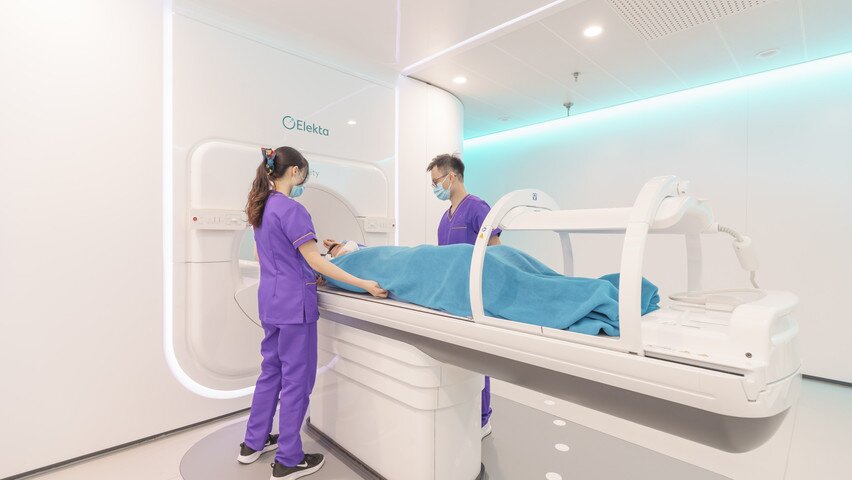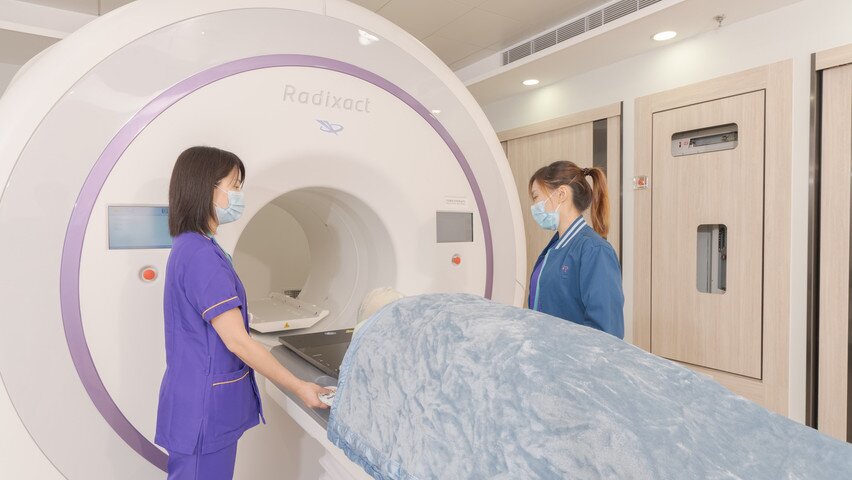Radiotherapy Centre
LG/F, CUHKMC
Introduction
Radiation therapy uses ionizing radiation for the treatment of patients with cancer. High energy radiation can destroy cancer cells or damage them so they cannot grow, multiply or spread. It can be used either alone or in combination with other treatment modalities such as surgery, chemotherapy, targeted therapy, immunotherapy or hormone therapy. Radiation therapy is a localised treatment that generally affects only the parts of body being treated. The treatment mostly spans over a number of days or weeks.
Our Services
We strive to provide the best possible treatment experience to our patients. With our specially designed coordinated care, we aim to offer outstanding radiation therapy services resulting in the best outcomes with minimal discomfort throughout the course of radiation treatment.
Our healthcare team is composed of dedicated and experienced oncologists and a team of specialized clinical staff. We are equipped with state-of-the-art technologies to provide high quality and effective treatment. You will never feel alone even on the first day in our centre as a designated care coordinator will become a companion for personalized care and information support for you and your family throughout your treatment journey. You can rest assured to receive services in our friendly environment.
Fees & Packages
Our Equipment
Our centre is equipped with two cutting-edge Image-Guided Radiotherapy (IGRT) treatment units at the forefront of radiation therapy care. The integration of advanced imaging technology with radiation therapy allows excellent verification of target and other structures, thus achieving utmost precision of treatment delivery for an improved clinical outcome and long-term cancer control. A reduction of the margins of treating volume with certainty helps spare more of the surrounding healthy tissues than ever before so that a higher radiation dose can be delivered each time to make the treatment course shorter.
Unity - MR Linac (located at the S H Ho MR Linac Centre)
The MR Linac integrates the power of 1.5T high-field Magnetic Resonance Imaging (MRI) with radiation therapy. The scan-plan-treat approach enables precise dose delivery with clear visualization of the tumour.
Provides an excellent soft-tissue visualization of the tumour and surrounding healthy tissues;
Allows online plan adaptation workflow to shape radiation beams to the changing tumour each day over the course of treatment;
Enables feasibility of monitoring tumour response to treatment.
Radixact X9 - Tomotherapy with Synchrony Tracking System
Tomotherapy delivers precise radiation treatment by combining integrated CT imaging with its unique helical treatment delivery method. Radiation is delivered from all angles as the gantry rotates and the couch translates through the gantry.
- Verifies every treatment by CT imaging to ensure accuracy;
- Features with Synchrony system allowing real-time tracking of moving tumour for target-focused treatments while avoiding surrounding healthy tissues;
- Allows a maximum treatment length of 135cm for seamless coverage of long-shaped targets or multi-lesions.
To complement our advanced treatment units, we have also installed a dedicated CT simulator (Somatom Confidence) and an MR simulator (Ingenia Elition 3.0T) for outlining treatment target and surrounding healthy tissues with high accuracy in order to design the best possible radiation treatment plans.
Our Techniques
Other than the usual three-dimensional conformal radiation therapy, our centre is also featured with cutting-edge techniques to achieve excellent treatment outcomes.
- Image-Guided Radiotherapy (IGRT)
- Helical Tomotherapy (HT)
- Breathing-Synchronized Radiotherapy (BSRT)
- Adaptive Radiotherapy (ART)
- Intensity-Modulated Radiotherapy (IMRT)
- Stereotactic Radiosurgery/Radiotherapy (SRS/SRT)
- Stereotactic Body Radiotherapy (SBRT)
- Four-dimensional Computed Tomography (4DCT)
- Deep Inspiration Breath Hold (DIBH)
Patient Journey at Our Centre
We understand patients may feel uncertain towards radiation therapy. We are pleased to let you know and understand every step of your treatment journey with us.
- Referral - Our Oncologists or your private doctor will refer you to our centre to get your first appointment.
- Reception - A care coordinator is assigned to provide personalized care and information support for you and your family.
- Moulding - We will customize a mould or other accessories specific to your need to help you keep still comfortably during radiation treatment to ensure accuracy.
- Simulation - We will take a specialized CT scan at our CT Simulator to get a 3D picture of your treatment site. Sometimes, you may also be asked to perform another MR scan at our MR Simulator.
- Computer Planning - Your responsible doctor and our professional team will do it for you. This includes outlining of tumour and surrounding healthy tissues, designing a customized radiation treatment plan and calculating radiation dose. We can definitely customize the best possible solution for you.
- Treatment - Depending on the treatment techniques used, each treatment session will take about 15 minutes to an hour at the treatment unit. Our Radiation Therapists will help you with the positioning for treatment. You will be closely monitored through our CCTV when you are alone in the treatment room. Light music will be provided to make your treatment even easier.
Your radiation treatment course mostly spans over a number of days or weeks. Side effects vary and depend on which body part is being treated. Common short-term side effects include tiredness, nausea, decreased appetite or skin reddening of the treated area. Our clinical team will monitor your situation and take appropriate measures to minimize your discomfort.
Generous Donation from The S.H. Ho Foundation
The Introduction of the Unity MR-Linac
The Radiotherapy Centre of CUHK Medical Centre (CUHKMC) has introduced a cutting-edge MR Image-guided radiotherapy machine, the Unity MR-Linac, with the generous donation from The S.H. Ho Foundation (the Foundation). The Unity MR-Linac integrates the power of high-field Magnetic Resonance Imaging (MRI) with radiation therapy for better cancer treatment. It enables excellent verification of target position over the treatment course, allowing immediate treatment plan adjustment to reduce risks of damage to the surrounding organs and normal tissues through more precise tumour targeting.
Subsidy Schemes
The Foundation has set up the S H Ho MR-Linac Centre Patient Endowment Fund (the Fund) to support entitled Hong Kong residents with quality and advanced radiotherapy through its investment returns.
Stereotactic Body Radiation Therapy Subsidy Scheme
The Stereotactic Body Radiation Therapy (SBRT) Subsidy Scheme is launched to help eligible cancer patients to receive specialist consultation and MR image-guided radiotherapy at CUHKMC. SBRT can be used to treat tumours in the liver, pancreas, prostate, bladder, brain, adrenal gland, as well as bone metastasis and oligometastasis.
| Scheme Details | Eligible patients will receive the following subsidised services at CUHKMC:
|
| Basic Criteria | Patient without medical care insurance cover |
| Level of Subsidy (in HKD) |
|
| Enquiry | Radiotherapy Centre, CUHK Medical Centre Tel: (852) 3946 6698 |
Radionuclide Services
Radioactive Iodine for Thyrotoxicosis
Radioactive iodine is a form of iodine that emits radiation. When it is absorbed by the body, it will be concentrated in the thyroid gland. The radiation given off will decrease the activity of thyroid cells and reduce thyroid hormone secretion. It is a safe, simple and convenient treatment that aims at long term control of thyrotoxicosis.
Indication
Treatment of thyrotoxicosis
Intended effects/benefits
- Radioactive iodine is taken by mouth in pill form normally. Most of the radioactivity is absorbed by the thyroid gland. Any radioactivity not collected by the thyroid gland will be eliminated within a few days through urine, faeces, saliva and sweat. Other tissues in your body will receive some incidental radiation during this time, but this small amount of radiation typically does not produce any adverse effect.
- It may take 2 to 6 months for radioactive iodine to take effect. Most patients can achieve long term control with one treatment, but some may need 2 or more treatments.
- There is no conclusive scientific evidence that radioactive iodine for thyrotoxicosis increases the risk of cancer. The dose of radioactive iodine used for treatment of thyrotoxicosis does not affect future fertility.
Radium-223 (Ra-223) Therapy
Radium-223 (Ra-223) dichloride is a radioactive drug that is administered through a vein into the body and then taken up by fast-growing bone tissue. The radiation given off kills the tumour cells that have spread to the bone. As Ra-223 releases a type of radiation that travels a very short distance, most of the effects of the drug are limited to the bone, and the risk for radiation exposure to other organs is low.
Indication
Prostate cancer patients with symptomatic bone metastases and no known visceral metastases.
Intended effects/benefits
- Reduce risk of pathological fracture
- Improve quality of life
Yttrium-90 (Y-90) Therapy
Yttrium-90 (Y-90) therapy, also known as Selective Internal Radiation Therapy (SIRT), combines embolisation and radionuclide therapy. It is an alternative treatment option for patients who are not fit for surgery. Compared with external radiotherapy, Y-90 therapy delivers higher radiation dose close to the tumour, so it is helpful in preserving surrounding healthy tissues.
Indication
Early- or Intermediate-Stage Liver Cancer patients
(With tumour size <8 cm and feasible vasculature for safe Y-90 microsphere delivery after hepatic angiography)
Intended effects/benefits
- The Y-90 microspheres are biocompatible microspheres containing Y-90 with a size approximately between 20 and 60 microns in diameter. Following delivery via a hepatic artery catheter, Y-90 microspheres become lodged in the micro-vessels of the liver tumour where they have a local radiation effect. There may be some limited damages to healthy tissues caused by Y-90 microspheres that fail to be embedded and escape outside the tumour. Following the radioactive decay of Y-90, the inert microspheres will be retained permanently in the tissues.
- Treatment with SIRT-Y90 exploits a normal physiological process to selectively target the tumour. Liver has dual blood supply. Malignant liver tumours larger than 2 cm usually receives about 80% of their blood supply from the hepatic artery while the healthy liver tissue receives most of its blood supply from the portal veins. Therefore, Y-90 injection through the hepatic artery permits the selective therapeutic effect of radioactive microspheres to the tumour cells.
Traditional Treatment Episode
- Each episode of SIRT typically requires two hospitalisations separated by one week. The first hospitalisation is for a nuclear medicine scanning that aids the treatment planning and the patient stays for 2 days.
- The second hospitalisation is arranged one week later for the Y-90 microspheres injection and the post-treatment isolation stay of about 2-4 days depending on the dosage used.
- The whole episode lasts about two weeks in total.
FAST Track Treatment Mode
- Apart from providing the traditional treatment mode, our centre has an option of FAST Track treatment mode of SIRT for the patients to choose if found clinically suitable.
- For the FAST Track, the patient only needs one hospitalisation; for instance, the patient is admitted on Monday and has the treatment planning. Then the Y-90 microspheres injection will be given on Tuesday and, counting the post-treatment isolation stay of 2-4 days, the whole episode is accomplished within 3-5 days. The patient will return home before the weekend.
- The FAST Track paradigm involves only one hospitalisation with a shorter period of treatment episode and can potentially reduce the time delay from planning to treatment.
Lutetium-177-PRRT (Lu-177-PRRT) Therapy
Lutetium-177-PRRT is a targeted radioactive drug that is administered through a vein into the body and then taken up by gastroenteropancreatic neuroendocrine cancer cells.
Indication
It is indicated for the treatment for gastroenteropancreatic neuroendocrine cancer patients.
Intended effects/benefits
Peptide Receptor is a unique receptor which can be found on the surface of many gastroenteropancreatic neuroendocrine cancer cells. As Lu-177-PRRT travels to those area where Peptide Receptor presents, Lu-177-PRRT releases a type of radiation that travels a very short distance, most of the effects of the drug are limited to the cancer cells, and the risk for radiation exposure to other organs is low. Therefore, Lu-177-PRRT Therapy could improve survival rate, reduce cancer-related symptoms and improve quality of life.
Lutetium-177-PSMA (Lu-177-PSMA) Therapy
Lutetium-177-PSMA is a radioactive drug that is administered through a vein into the body and then taken up by prostate cancer cells.
Indication
It is indicated for the treatment for metastatic castration-resistant prostate cancer patients.
Intended effects/benefits
PSMA is a unique receptor which can be found on the surface of many prostate cancer cells. As Lu-177-PSMA travels to those area where PSMA presents, Lu-177-PSMA releases a type of radiation that travels a very short distance, most of the effects of the drug are limited to the cancer cells, and the risk for radiation exposure to other organs is low. Therefore, Lu-177-PSMA Therapy could improve survival rate, reduce cancer-related symptoms and improve quality of life.
Download Flyers














 (852) 3946 6698
(852) 3946 6698 LG/F, CUHKMC
LG/F, CUHKMC